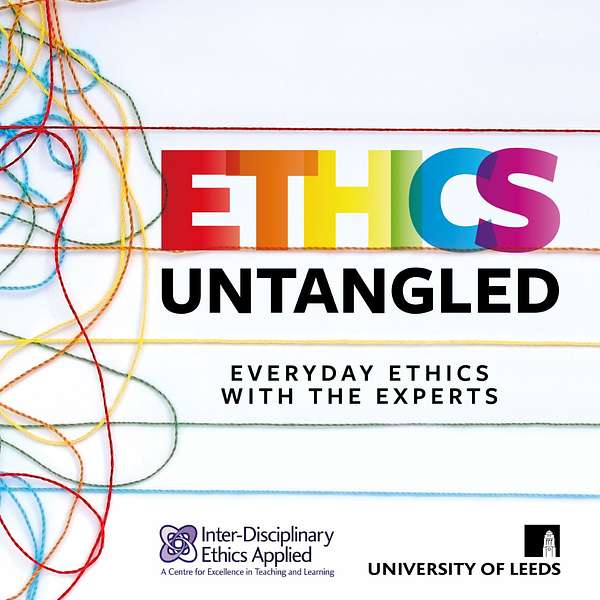
Ethics Untangled
Ethics Untangled is a series of conversations about the ethical issues that affect all of us, with academics who have spent some time thinking about them. It is brought to you by the IDEA Centre, a specialist unit for teaching, research, training and consultancy in Applied Ethics at the University of Leeds.
Find out more about IDEA, including our Masters programmes in Healthcare Ethics and Applied and Professional Ethics, our PhDs and our consultancy services, here:
ahc.leeds.ac.uk/ethics
Ethics Untangled is edited by Mark Smith at Leeds Media Services.
Music is by Kate Wood.
Ethics Untangled
6. What's interesting about punishment, forgiveness and revenge? With Paula Satne and Krisanna Scheiter
Paula Satne is a Lecturer in Applied Ethics at the IDEA Centre. Her research focuses on theoretical and applied issues related to human evil and the ethics and politics of forgiveness and memory. Her recent research is on Kantian forgiveness, political forgiveness and public commemoration of politically motivated wrongdoing, punishment, pacifism, and conflict resolution, and our shared complicity and responsibility for structural injustice (i.e., climate change, poverty, and war).
Krisanna Scheiter is Associate Professor and Chair of Philosophy at Union College. She specializes in ancient Greek and Roman philosophy. Her research focuses on Plato and Aristotle's accounts of emotion, desire, imagination, and thinking. Most recently her work explores Plato and Aristotle's account of the mind, knowledge, and truth. In addition, she continues to examine Aristotle's account of revenge and why he thinks sometimes we are justified in seeking revenge against wrongdoers.
In this episode I met with both of them to discuss the edited volume they have recently published on punishment, forgiveness and revenge. These are ideas that are interesting on a personal level: is it good to forgive? Are there any circumstances in which we might be required to forgive? Can there ever be any value in taking revenge on people who have wronged us? But they also arise on a societal or international level: should groups of people forgive or forget historic wrongs that have been perpetrated against them? What is the point of punishment, and does the state have the right to punish its citizens?
Apologies for the slight sound issues with this episode, which was recorded remotely.
This episode includes discussion of the death penalty in the context of a discussion of Seneca’s views. Both Krisanna and Paula want to make it clear that, unlike Seneca, they do not personally endorse the death penalty.
Paula and Krisanna's book, Conflict and Resolution: The Ethics of Forgiveness, Revenge and Punishment is available here: https://link.springer.com/book/10.1007/978-3-030-77807-1.
A chapter from the book, written by Paula, is available open access here: https://link.springer.com/chapter/10.1007/978-3-030-77807-1_16.
Krisanna's chapter (not open access) is here: https://link.springer.com/chapter/10.1007/978-3-030-77807-1_2
Ethics Untangled is produced by IDEA, The Ethics Centre at the University of Leeds.
Bluesky: @ethicsuntangled.bsky.social
Facebook: https://www.facebook.com/ideacetl
LinkedIn: https://www.linkedin.com/company/idea-ethics-centre/